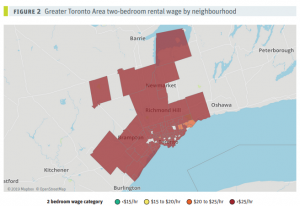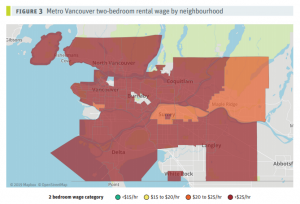
Source: Macdonald, D. 2019. Unaccommodating: Rental Wage in Canada. CCPA
In a recent report entitled “Unaccommodating: Rental Wage in Canada,” the Canadian Center of Policy Alternatives calculated the “rental wage” for cities across Canada. This “rental wage” is defined as the hourly wage required to afford to rent an average two-bedroom apartment using no more than 30% of their income.
The highest average rental wages were found in Toronto, ON ($33.70/hr) and Victoria, BC ($28.47/hr), followed by Calgary, AB ($26.97/hr) and Ottawa, ON ($26.08/hr). When considering downtown cores, however, rents grow even higher. For example, the rental wage for a two-bedroom apartment in Toronto’s downtown is estimated at $73.17/hr and in Vancouver’s downtown it is closer to $60.93/hr. This forces many people to move to outlying areas where commutes are longer and often require a car to travel. Montreal was identified as a notable exception, as affordable neighbourhoods continue to abound in the downtown core and public transit is more extensive.
One reason for high rents is associated with fewer new apartment buildings, with many developers preferring to build condominiums instead. Renewed efforts by the federal government to develop affordable housing units is expected to ease the market but targets are lower than previous efforts in the 1970s and 1980s.

Source: Macdonald, D. 2019. Unaccommodating: Rental Wage in Canada. CCPA
On The Move recently investigated the relationship between housing prices, commute times, and labour supply in the construction industry, with a focus on Toronto and Vancouver, in a report found here entitled “Impact of Rising Housing Prices in Canada’s Big Cities: A Report for BuildForce.” While we found no studies that directly linked these factors, one study found that high housing prices in Toronto were forcing people to live in outlying areas, and that nearly 40% of people were commuting more than an hour to work each way every day. While some studies found that people could not afford to participate in long work commutes for low wages, others found that people in Toronto had little choice but to participate in long commutes for work. The lack of affordable housing in these cities was found to be a strain on families, with more than 100,000 people on a wait list for subsidized housing and 20% reporting living in overcrowded housing.
These factors could be hurting recruitment efforts in the construction and other industries. To rectify the labour shortage, we recommended construction of more affordable and subsidized housing units, as well as improved public transit.


Leave a Reply